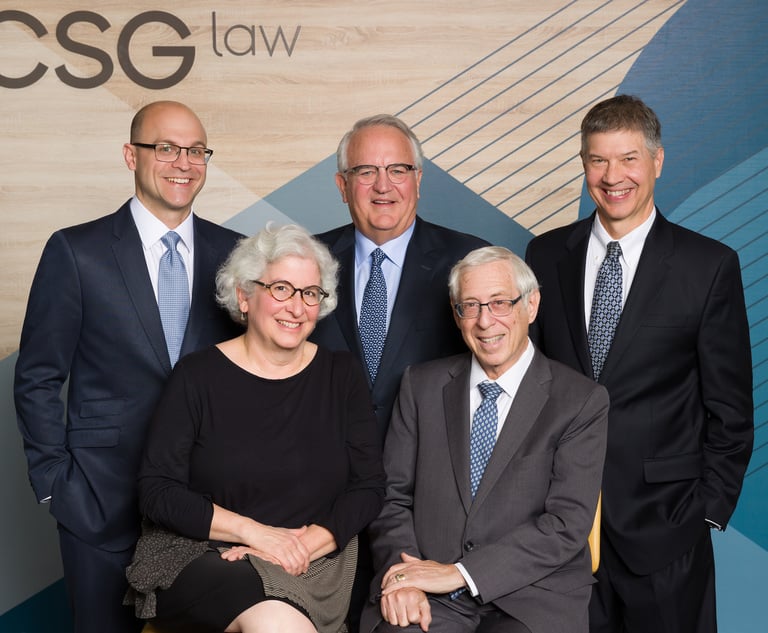 Charles F. Kenny of Peckar & Abramson
Charles F. Kenny of Peckar & AbramsonMentoring: 'We Do It to Maintain the Highest Quality of Services,' Peckar & Abramson's Charles Kenny Says
"What could be more essential than the need to mentor inexperienced attorneys who need to become 'counselors' in the true meaning of that word?"
June 10, 2019 at 05:59 PM
3 minute read
Charles F. Kenny, co-managing partner of Peckar & Abramson's New Jersey office in River Edge and a longtime construction litigator, has empowered numerous attorneys to work independently, often encouraging direct client contact, and at the same time has offered them guidance that helps them succeed as practitioners and advance their careers. “Under Mr. Kenny's mentorship, a number of attorneys have been elevated to partner at Peckar & Abramson and others have been hired by clients of the firm,” one colleague said, noting numerous examples. “Mr. Kenny speaks with less experience[d] attorneys (and peers) regularly about their assignments, billable hours and marketing efforts.” Kenny also is active in writing, teaching and professional organizations.
Is the role of mentor one that you set out to take, or one you happened into?
Both. It's a natural progression of my over 40 years in practice, the growth and expansion of my firm, my eventual moving into a leadership role, the changing nature of the practice and my clear memories of my own difficulties in starting out and doing things for the first time and how I could make that better for attorneys and support personnel who followed me.
Why are mentors so important in the legal profession?
An apt synonym for mentor is counselor. What could be more essential than the need to mentor inexperienced attorneys who need to become “counselors” in the true meaning of that word? We do it to maintain the highest quality of services for clients as well to develop the support we need so these freshly-minted attorneys can become our partners and successors.
Good mentors often have learned from good examples. Who are some people who have mentored you?
The founder and former chairman of Peckar & Abramson, Robert Peckar, was certainly someone whose style and substance influenced and helped me become a better lawyer and counselor to our clients.
Law is, for many, more than a full-time job. How does one create time for mentorship?
The willingness to share skills, knowledge and experience with younger attorneys ultimately pays huge dividends both personally and professionally. An experienced attorney who does not make the time to mentor when they have the opportunity to do so makes a huge mistake.
How are the business and profession of law changing, and are New Jersey lawyers well-positioned for the future?
The obvious changes are the increased specialization in the profession, electronic communication, diversity, the mounting costs involved in legal services and compliance issues. I can't speak for New Jersey lawyers as a whole but both the ABA and the NJSBA appear to be cognizant of these changes and ready to address them.
This content has been archived. It is available through our partners, LexisNexis® and Bloomberg Law.
To view this content, please continue to their sites.
Not a Lexis Subscriber?
Subscribe Now
Not a Bloomberg Law Subscriber?
Subscribe Now
NOT FOR REPRINT
© 2024 ALM Global, LLC, All Rights Reserved. Request academic re-use from www.copyright.com. All other uses, submit a request to [email protected]. For more information visit Asset & Logo Licensing.
You Might Like
View All
Appellate Div. Follows Fed Reasoning on Recusal for Legislator-Turned-Judge
4 minute read
Chiesa Shahinian Bolsters Corporate Practice With 5 From Newark Boutique
5 minute read
'A Mockery' of Deposition Rules: Walgreens Wins Sanctions Dispute Over Corporate Witness Allegedly Unfamiliar With Company

$113K Sanction Award to Law Firm at Stake: NJ Supreme Court Will Consider 'Unsettled Law' Frivolous Litigation Question
4 minute readTrending Stories
- 1DOJ Asks 5th Circuit to Publish Opinion Upholding Gun Ban for Felon
- 2GEO Group Sued Over 2 Wrongful Deaths
- 3Revenue Up at Homegrown Texas Firms Through Q3, Though Demand Slipped Slightly
- 4Warner Bros. Accused of Misleading Investors on NBA Talks
- 5FTC Settles With Security Firm Over AI Claims Under Agency's Compliance Program
Who Got The Work
Michael G. Bongiorno, Andrew Scott Dulberg and Elizabeth E. Driscoll from Wilmer Cutler Pickering Hale and Dorr have stepped in to represent Symbotic Inc., an A.I.-enabled technology platform that focuses on increasing supply chain efficiency, and other defendants in a pending shareholder derivative lawsuit. The case, filed Oct. 2 in Massachusetts District Court by the Brown Law Firm on behalf of Stephen Austen, accuses certain officers and directors of misleading investors in regard to Symbotic's potential for margin growth by failing to disclose that the company was not equipped to timely deploy its systems or manage expenses through project delays. The case, assigned to U.S. District Judge Nathaniel M. Gorton, is 1:24-cv-12522, Austen v. Cohen et al.
Who Got The Work
Edmund Polubinski and Marie Killmond of Davis Polk & Wardwell have entered appearances for data platform software development company MongoDB and other defendants in a pending shareholder derivative lawsuit. The action, filed Oct. 7 in New York Southern District Court by the Brown Law Firm, accuses the company's directors and/or officers of falsely expressing confidence in the company’s restructuring of its sales incentive plan and downplaying the severity of decreases in its upfront commitments. The case is 1:24-cv-07594, Roy v. Ittycheria et al.
Who Got The Work
Amy O. Bruchs and Kurt F. Ellison of Michael Best & Friedrich have entered appearances for Epic Systems Corp. in a pending employment discrimination lawsuit. The suit was filed Sept. 7 in Wisconsin Western District Court by Levine Eisberner LLC and Siri & Glimstad on behalf of a project manager who claims that he was wrongfully terminated after applying for a religious exemption to the defendant's COVID-19 vaccine mandate. The case, assigned to U.S. Magistrate Judge Anita Marie Boor, is 3:24-cv-00630, Secker, Nathan v. Epic Systems Corporation.
Who Got The Work
David X. Sullivan, Thomas J. Finn and Gregory A. Hall from McCarter & English have entered appearances for Sunrun Installation Services in a pending civil rights lawsuit. The complaint was filed Sept. 4 in Connecticut District Court by attorney Robert M. Berke on behalf of former employee George Edward Steins, who was arrested and charged with employing an unregistered home improvement salesperson. The complaint alleges that had Sunrun informed the Connecticut Department of Consumer Protection that the plaintiff's employment had ended in 2017 and that he no longer held Sunrun's home improvement contractor license, he would not have been hit with charges, which were dismissed in May 2024. The case, assigned to U.S. District Judge Jeffrey A. Meyer, is 3:24-cv-01423, Steins v. Sunrun, Inc. et al.
Who Got The Work
Greenberg Traurig shareholder Joshua L. Raskin has entered an appearance for boohoo.com UK Ltd. in a pending patent infringement lawsuit. The suit, filed Sept. 3 in Texas Eastern District Court by Rozier Hardt McDonough on behalf of Alto Dynamics, asserts five patents related to an online shopping platform. The case, assigned to U.S. District Judge Rodney Gilstrap, is 2:24-cv-00719, Alto Dynamics, LLC v. boohoo.com UK Limited.
Featured Firms
Law Offices of Gary Martin Hays & Associates, P.C.
(470) 294-1674
Law Offices of Mark E. Salomone
(857) 444-6468
Smith & Hassler
(713) 739-1250






